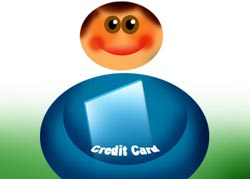 colleague of mine is continually harassed by credit card sales agents.
colleague of mine is continually harassed by credit card sales agents.
They call him with alarming frequency and then try to coax him with various baits - balance transfer facility at a lower interest rate, no card membership fee, no annual fee, free points if he takes the card, or even a cash back scheme.
 His rationale: he does not need a card.
His rationale: he does not need a card.
And, believe me, he is quite convincing in his logic. Here are some of his common arguments.
Ever tried paying the bus conductor, the taxi driver or an auto rickshaw driver by card?
Attempted to give your maid her salary by card?
Love to have a cup of tea at a roadside stall? Or even a juice? Or even buy a packet of cigarettes from the wayside shop? Sorry, cards are not accepted!
Want to buy a bunch of flowers? Hard cash please!
He claims that for most of his transactions, he requires just plain paper money - plastic does not work.
But, I am not convinced.
I definitely need a card and here's how I use it to manage my money.
The small payments are endless
Of course, my good old sabziwala, with fresher veggies than the supermarket, will not entertain my plastic money. Neither will the small, local grocery store.
But when I do drop by at the supermarket or department store, the card sure is handy. Ditto at the petrol pump.
Actually, in a city, chances are that you can use a credit card to pay up to 75% of routine monthly expenses.
Often, the bill may just be a few hundreds and usually an odd sum. Have you ever had the experience of having to pay, say Rs 107, but only be in possession of notes of Rs 100 denomination?
In such a situation, the card makes it a smooth transaction. I need not bother about hunting for change or filling my wallet with coins.
The convenience is unmatched
If I have to make some urgent payments for which I don't have cash, I need not make endless trips to the ATM.
Nor do I have to run to a bank for a personal loan.
Or, take the case of a medical emergency. At such times, a card is a blessing.
The big ticket expenses
Suddenly had the urge to buy that plasma screen television? After all, what could be better than watching a good movie, on a wide screen on a rainy day?
Why wait for the next paycheck? Use your card.
This is how it works. Banks generally prepare the bills a couple of days before the bill date.
Purchases made at the fag end of the billing cycle or at the immediate start of the next billing cycle will give you a longer credit line. Which means you get more time to pay the bank.
Say your next billing is from 21 September to October 20 and your due date to settle the bill is November 11.
Purchase that television on October 21, give or take a day or two. You will get free credit till December 11 (around 51 days).
And what's more? If I took a personal loan to make the above purchase, I would be dishing out an interest rate of around 18% per annum (around 11% if I took it from my company). Here, I get interest-free credit on my card!
It gets you out of trouble
Specially when you have to make birthday and anniversary gifts to your girlfriend and you are either low on cash or the gift is too expensive (often both).
Let's say I earn Rs 20,000 a month, out of which I spend Rs 10,000 on living expenses. Now, if it is my girl friend's birthday and I plan to buy her a necklace worth Rs 20,000, I may not have that much saved.
The way out? Buy it on my card instead of waiting to accumulate that amount in my savings and gifting it to her a month after her birthday.
When my credit card bill is finally presented to me, my salary would be credited to my account and I would have accumulated enough to make the payment.
It acts as a budgeting tool
The problem with spending cash is that you never know what you spend on. With a credit card, the billing statement is a reality check.
I closely study my statement. This gives me a fairly good idea of my spending pattern.
At a glance, you can tell where the bulk of your salary goes: books, entertainment, shopping, petrol or on essentials.
Use it, don't get used by it
Sure, the card does have its limitations (which I mentioned earlier) and setbacks too.
Credit card frauds (specially over the internet) are increasing by the day.
And, if you are not careful, it is very simple to indulge in a high lifestyle, convinced that you can pay off your debt later. Once you spend more than what you can afford, you are forced to carry over the balance amount to the next month. And that's when your credit card becomes your enemy. Now you pay heavily for this money at least 24% per annum.
But, if you use it well, it is a handy money management tool.
Not to mention all the points that would accumulate eventually which can be exchanged to make a purchase or get a gift. Alright, it may not be a great bargain but nevertheless, it will cost you nothing.
In some cases, you get some amount of money back under the "cash back" scheme. In others, if you are paying an annual fee, you can redeem these points against the fee. But do remember, nearly all the cards being issued these days have free lifetime membership.
So while I respect my colleague's opinion, I am quite convinced that I do not want to live without a card.
What about you, dear reader? Has the credit card worked for your benefit? We would love to hear from you.
Illustration: Dominic Xavier







